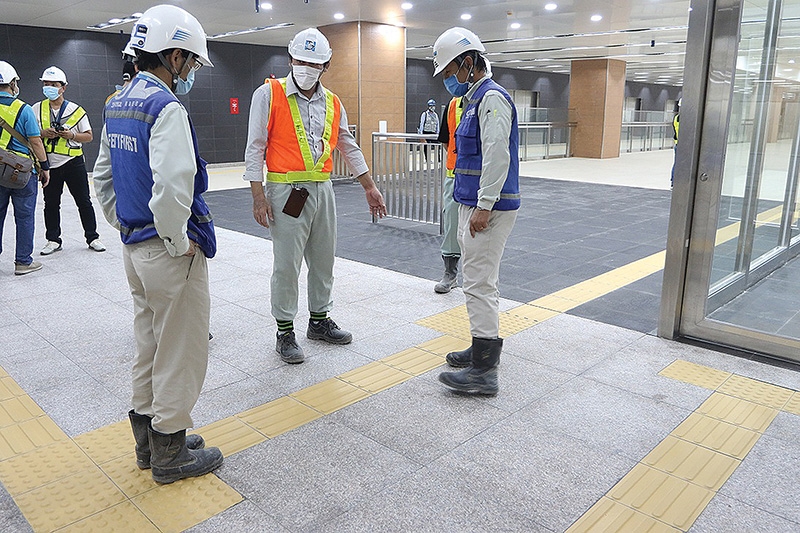Trade kickstart with distinctive solutions
 |
| Vietnam is allowing experts and managers to enter from Japan in order to boost investment projects, Photo: Le Toan |
Le Thi Thu Hang, spokesperson of the Ministry of Foreign Affairs (MoFA), told VIR that based on the situation and demands of both sides, Vietnam is now working with a number of nations such as China, South Korea, and Japan to resume investment and trade activities, with the strict obedience of anti-pandemic measures under specific conditions.
“For the time being, we will facilitate experts and managers from these nations to come to Vietnam to work, and Vietnamese labourers to come to the nations to work,” Hang said.
One of the reasons behind this move is that these markets have controlled the pandemic well, and are Vietnam’s major trade partners.
Last week, 440 Japanese experts and entrepreneurs came to Vietnam to continue engaging in projects in Vietnam. “Vietnam and Japan have agreed that they will gradually loosen the travelling limit between the two countries. Specific measures and procedures will be exchanged via the diplomatic channel,” the MoFA said in a statement.
Earlier Prime Minister Nguyen Xuan Phuc had phone-based talks with Japanese counterpart Shinzo Abe, with one focus laid on expanding both nations’ trade and investment ties, also backed by some bilateral agreements. Two-way trade hit $40 billion last year and $16.2 billion in the first five months, including $8.1 billion earned by Vietnam from exporting to Japan.
On June 12, Vietnam agreed to allow 331 experts, managers, and high-skilled labourers from China to enter its territory. The move was made after the Government Office received a diplomatic note from China’s Embassy to Vietnam asking Vietnam to permit those people to enter the country to implement their projects here.
A week ago, Deputy Prime Minister, Minister of Foreign Affairs Pham Binh Minh held telephone talks with Kuwaiti counterpart Ahmad Nasser Al-Mohammad Al-Sabah, discussing various “breakthrough solutions” to expand bilateral trade and investment ties. Bilateral trade turnover reached $3.6 billion last year and currently both nations are further cementing energy co-operation, focusing on oil and gas.
Vietnam wants to boost exports of agricultural products, consumer goods, electronics, garments and textiles, and building materials to Kuwait, where demand for these products are on the rise.
Meanwhile, seeking to further consolidate Vietnam-Russian ties, two weeks ago Party General Secretary, State President Nguyen Phu Trong and Russia’s President Vladimir Putin held phone talks, reaffirming that despite COVID-19 both sides will continue boosting co-operation in defence, security, and energy. They support and encourage both nations’ oil firms to engage in new projects in Vietnam and Russia. This will help realise the countries’ goal of reaching $10 billion over the next few years, from nearly $4 billion last year.
Also two weeks ago, PM Phuc had a phone call with French counterpart Edouard Philippe to boost both nations’ trade and investment ties, especially amid the upcoming entry into force of the EU-Vietnam Free Trade Agreement, which will usher in massive trade and investment opportunities for both nations.
The EU is now Vietnam’s third-largest exporting market, which spent $13 billion importing Vietnamese goods in the first five months of 2020, when it also sold $5.8 billion worth of goods to Vietnam, which considers the EU its sixth-largest importing market.
Over the past five weeks, newly-established Thai-invested Amuay Textile and Garment Co., Ltd. at Hanoi’s Quang Minh Industrial Park has resumed operations of its three production lines after a month-long halt caused by COVID-19, which locked the company from exporting its products to some European nations.
“We have recently landed an export order from a Canadian partner, with a total contract value of $1 million. We will boost production to ship goods to Canada,” said Vu Thai Hang, vice head of the company’s marketing department. “Canada is a new market for Amuay, and import tariffs on garments and textiles have begun to decrease in 2020 under the Comprehensive and Progressive Agreement for Trans-Pacific Partnership (CPTPP).”
Currently though Canada is still shutting its borders, it is beginning a “staggered reopening”. Many Canadian businesses are seeking orders online, such as the case with Amuay, and hoping that their government will lift the lockdown soon.
According to the Vietnamese Ministry of Industry and Trade (MoIT), Canada is planning to increase imports of Vietnam’s key products including garments and textiles, footwear, aquatic products, electronics, and some types of machinery.
So as to expand Vietnam’s exports to Canada, Minister of Industry and Trade Tran Tuan Anh recently held a telephone call with Mary Ng, Canada’s Minister of Small Business, Export Promotion and International Trade.
He suggested that Canada consider the establishment of an intergovernmental commission on economic and trade co-operation, which will help further amplify both nations’ investment and trade ties currently spurred on by the CPTPP entering into force in January 2019.
What the stars mean:
★ Poor ★ ★ Promising ★★★ Good ★★★★ Very good ★★★★★ Exceptional
Related Contents
Latest News
More News
- NAB Innovation Centre underscores Vietnam’s appeal for tech investment (January 30, 2026 | 11:16)
- Vietnam moves towards market-based fuel management with E10 rollout (January 30, 2026 | 11:10)
- Vietnam startup funding enters a period of capital reset (January 30, 2026 | 11:06)
- Vietnam strengthens public debt management with World Bank and IMF (January 30, 2026 | 11:00)
- PM inspects APEC 2027 project progress in An Giang province (January 29, 2026 | 09:00)
- Vietnam among the world’s top 15 trading nations (January 28, 2026 | 17:12)
- Vietnam accelerates preparations for arbitration centre linked to new financial hub (January 28, 2026 | 17:09)
- Vietnam's IPO market on recovery trajectory (January 28, 2026 | 17:04)
- Digital economy takes centre stage in Vietnam’s new growth model (January 28, 2026 | 11:43)
- EU Council president to visit Vietnam amid partnership upgrade (January 28, 2026 | 11:00)

 Tag:
Tag:



















 Mobile Version
Mobile Version